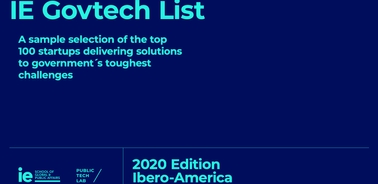- Home
- News And Events
- News
- Ie University Presents The 'ie Govtech 2020 List' Showcasing The 100 Most Promising Govtechs In Latin America
IE University presents The 'IE Govtech 2020 List' Showcasing the 100 most promising govtechs in Latin America

The IE Govtech 2020 List reveals that cities are key players in the solutions proposed by startups.
IE University's PublicTech Lab has presented the IE Govtech 2020 List, a report that showcases the 100 digital startups, scaleups and SMEs with the greatest impact in Latin America, Spain and Portugal. These are the companies which are building innovative proposals to respond to the challenges faced by governments and public agencies at local, regional and national level.
In drawing up this list, the authors have taken into account the quality of the startups based on their market traction, team, business model and product. The IE Govtech 2020 List includes 59 Spanish, 11 Chilean, 9 Colombian, 7 Mexican, 5 Argentinean, 5 Brazilian, and 3 Portuguese firms, as well as 1 Uruguayan company.
The study divided the organisations into four categories, based on the CAF Development Bank of Latin America's govtech classification: firms that provide public services, firms that promote public sector integrity and management projects, firms that offer digital infrastructure solutions, and firms that guarantee democratic quality.
The authors of the IE Govtech 2020 List confirm that most of the solutions focus on improving service provision (37%) and public management (31%), pointing out that digital startups and SMEs can deliver significant added value, especially in the "last mile" of citizen services, and in the day-to-day operations and decision-making processes of government officials.
The categories and business sectors that appear in the list include industries with a long history in the world of innovation, such as health and education, and others that have gained in importance in recent years, such as participation and transparency in the Open Government category.
The IE Govtech 2020 List reveals that cities are key players in the solutions proposed by startups. Urban spaces are the main govtech innovation laboratories in areas such as smart management, accessibility and mobility.
Likewise, the study's authors underscore the importance of data analysis, with a large number of startups involved in optimising data collection and management systems that enable them to predict behaviour, identify inefficiencies, inform citizens and monitor results.
Some of the proposals featured in IE University's Govtech 2020 List include preventing bullying in schools, enhancing patients’ hospital experiences, simplifying the running and management of cities, and ensuring access to all government services for people with functional diversity.
“Our goal in compiling this IE Govtech 2020 List has been to provide solutions for public-sector agencies that are striving to design services based on real human needs.”
“Our goal in compiling this IE Govtech 2020 List has been to provide solutions for public-sector agencies that are striving to design services based on real human needs. This first list has primarily focused on the Spanish market, but we have also tried to reflect the potential of Portugal and the main entrepreneurial markets in Latin America,” explains Beatriz Belmonte, who led the compilation of the list.
“The idea of this list is to showcase existing innovations in the market and to bring these solutions closer to government agencies. Our objective is to promote digital transformation in public policies and to generate opportunities for innovative companies in our regions,” said Idoia Ortiz de Artiñano, Director of IE University's PublicTech Lab.
For more information, visit www.govtechchallenge.es.